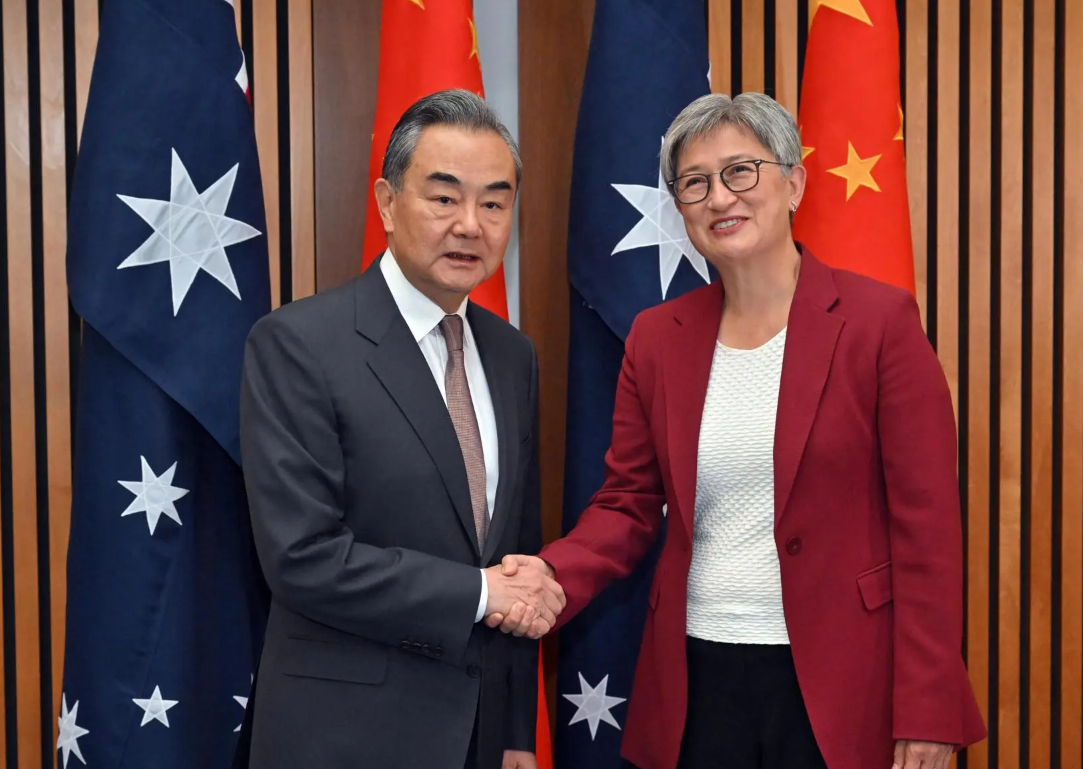
China's Foreign Minister Wang Yi meets with Australia's Minister for Foreign Affairs Penny Wong (R) at Parliament House, in Canberra, Australia, 20 March 2024. EFE-EPA/MICK TSIKAS
Foreign Minister Wang Yi visited New Zealand and Australia from March 17 to 21. Of particular note was that his visit to Canberra was his first in seven years, and it kicked off a new round of high-level exchanges between the two nations.
Wang met with Australian Prime Minister Anthony Albanese and joined the seventh round of China-Australia Diplomatic and Strategic Dialogue with his Australian counterpart, Penny Wong. The trip sent an important signal of constructive engagement by the two countries and promises to promote the steady development of China-Australia relations in the long run.
After the establishment of the comprehensive strategic partnership in 2014, China-Australia relations encountered many challenges and in recent years fell into a deep freeze. However, following adjustments in China policy by the Australian Labor Party government, which took office in May 2022, signs of a thaw in bilateral relations have emerged.
Thanks to the concerted efforts of many parties, dialogue and communication have resumed on economic and trade issues, consular affairs, climate change, defense and regional and international issues. Trade restrictions have been lifted; high-level dialogues have increased significantly and engagement with various sectors of society has intensified.
In November, Prime Minister Albanese visited China and met with President Xi Jinping, underscoring the importance of building on past success to foster future cooperation. Subsequently, bilateral relations have gotten back on track to “set out on a new journey.”
In December, on the occasion of the 50th anniversary of diplomatic relations, Australian Foreign Minister Penny Wong visited China. During her visit, she reiterated Australia’s commitment to its original aspiration when establishing relations with China and stressed the need to seek common ground while shelving differences and to promote win-win cooperation. All these efforts have laid the groundwork for greater progress in bilateral relations over the next half-century.
This year is the 10th anniversary of the establishment of a comprehensive strategic partnership between China and Australia. This milestone is not only an important moment to review progress, experiences and lessons but also is the first year after both sides pledged to resume annual leaders’ meetings. Against the backdrop of continued improvement in bilateral relations, the two countries have been actively engaging with each other to seek consensus, thereby creating the conditions needed for the resumption of these meetings.
Results-oriented cooperation
Further engagement between China and Australia depends not only on the efforts of national leaders but also on economic complementary and shared aspirations for win-win economic and trade cooperation. With the thawing of icy relations last year, the Australian business community has placed high hopes on the Labor government to repair bilateral relations and resume exchanges.
Through the concerted efforts of all parties, bilateral trade disputes have been resolved: import restrictions on coal, cotton, barley and other products from Australia have been gradually lifted; wine tariffs may be lifted in the near future; and consultations regarding quarantine procedures for imports of lobsters, red meat and other commodities are underway. This explains why trade between China and Australia has grown despite the global economic downturn and the spillover of multiple risks. Today, Australia derives nearly 80 percent of its trade surplus from China. Undoubtedly, the growth of two-way trade benefits the people of both countries and contributes to the functioning of the world economy.
In addition to traditional areas of cooperation, such as energy and agricultural products, the two countries have many compatible interests and demands in new energy, the digital economy and green development, hence they have ample opportunity for collaborative efforts to achieve breakthroughs. Stable people-to-people exchanges and a solid foundation of public opinion are essential to help China-Australia relations move forward faster and further, while safeguarding against regression to past tensions.
Results-oriented cooperation in various fields will continue to expand the scale and impact of the comprehensive strategic partnership and add to the resilience and momentum of bilateral relations.
Stable relations in Australia’s interest
Recognizing the importance of dialogue between the two countries, the Australian Labor Party government has repeatedly emphasized the importance of not allowing differences to define bilateral relations. Stable China-Australia relations are crucial to regional peace and stability. Both countries are independent nations that respect each other, and together they can maximize the effects of results-oriented cooperation.
Improvement in China-Australia relations is partly a result of this shift in thinking and narrative, which is also a rich source of inspiration.
First, candid communication and problem-solving are constructive pathways to advance bilateral relations. Despite the ups and downs in relations, time and experience have proved that only by maintaining interaction and strengthening communication can the two countries create an opportunity to navigate their differences and properly cope with risks and challenges.
Australia is a close ally of the United States and also an important trading partner of China, but there is no need for it to pick sides. Yet, it needs to stay somber amid the noise of electoral politics, maintaining a long-term perspective and following the general trends of the world to better defend its developmental interests.
Second, managing expectations and controlling differences in an uncertain world is no easy feat. As profound changes unseen in a century unfold, no country is immune. Meanwhile — amid disturbing trends, such as anti-globalization, protectionism and regional conflicts — uncertainty breeds risks and stability takes on greater significance. As their relations have weathered numerous storms, China and Australia have shown they have what it takes to enhance certainty in the geopolitical landscape, boost mutual trust, strengthen risk management and bolster regional peace and stability.

